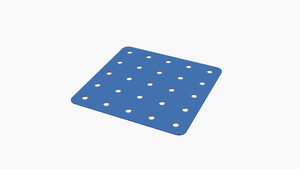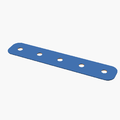Plates: Difference between revisions
No edit summary |
No edit summary |
||
| (23 intermediate revisions by the same user not shown) | |||
| Line 1: | Line 1: | ||
{{Parts infobox | |||
|image = Plate-5x5.scad.png | |||
|designers = [[User:Tim|Timothy Schmidt]] | |||
|date = 2019 | |||
|vitamins = | |||
|materials = | |||
|transformations = | |||
|lifecycles = | |||
|tools = [[CNC routers]], [[Drill presses]], [[Saws]] | |||
|parts = [[Sheets]], [[Structural insulated panels]] | |||
|techniques = | |||
|files = | |||
|sources = [http://makerstore.cc/ Makerstore.cc] | |||
|git = | |||
}} | |||
[[Category:Parts]] | |||
[[Category:Structure parts]] | |||
=Introduction= | =Introduction= | ||
Many parts do not match the Replimat hole pattern. They are often the most unique and purposeful components of a project which is the reason they are often the easiest part to start building from. Adapter plates can be manufactured with simple tools like a saw and drill for any part with an existing planar mounting holes. | Many parts do not match the Replimat hole pattern. They are often the most unique and purposeful components of a project which is the reason they are often the easiest part to start building from. Adapter plates can be manufactured with simple tools like a saw and drill for any part with an existing planar mounting holes. | ||
| Line 6: | Line 25: | ||
=Approaches= | =Approaches= | ||
Create mounting plates from flat material, which contain the Replimat hole pattern, and a mounting pattern for an associated part. | Create mounting plates from flat material, which contain the Replimat hole pattern, and a mounting pattern for an associated part. Drilling or cutting multiple overlapping hole patterns into the same plate can allow it to be bolted to several different size frames. | ||
<gallery> | |||
Plate-5x1.png|5x1 plate | |||
Plate-5x5.scad.png|5x5 plate | |||
Plate-5x10.png|5x10 plate | |||
Plate-10x10.scad.png|10x10 plate | |||
Plate-15x10.png|15x10 plate | |||
Plate-griddome.png|Geodesic dome plate | |||
Plate-vesa-mount.png|VESA mount plate | |||
Plate-three-point-hitch.scad.png|Three point hitch plate adapts to 5/8 inch, 3/4 inch, 7/8 inch | |||
Plate-inch-to-2040mm.scad.png|Inch to 20mm / 40mm adapter plate | |||
</gallery> | |||
==Corner plates== | ==Corner plates== | ||
| Line 28: | Line 53: | ||
* 5x10 | * 5x10 | ||
* 5x1 | * 5x1 | ||
=Resources= | =Resources= | ||
* [https://www.thingiverse.com/thing:2187167 Parametric Hinge] | * [https://www.thingiverse.com/thing:2187167 Parametric Hinge] | ||
* [https://www.prismaticpowders.com/shop/powder-coating-colors Prismatic Powders powder coating] | * [https://www.prismaticpowders.com/shop/powder-coating-colors Prismatic Powders powder coating] | ||
* [https://en.wikipedia.org/wiki/Rivet_nut Rivet nuts] | |||
[ | * [https://www.thingiverse.com/thing:537516 Pegboard wizard] | ||
<youtube>2e9lfhmBgYU</youtube> | |||
Latest revision as of 01:12, 28 October 2021
| Designers: | Timothy Schmidt |
|---|---|
| Tools: | CNC routers, Drill presses, Saws |
| Parts: | Sheets, Structural insulated panels |
| Sources: | Makerstore.cc |
Introduction
Many parts do not match the Replimat hole pattern. They are often the most unique and purposeful components of a project which is the reason they are often the easiest part to start building from. Adapter plates can be manufactured with simple tools like a saw and drill for any part with an existing planar mounting holes.
Challenges
Plate thickness should conform to standard frames, bolts, nuts, and washers.
Approaches
Create mounting plates from flat material, which contain the Replimat hole pattern, and a mounting pattern for an associated part. Drilling or cutting multiple overlapping hole patterns into the same plate can allow it to be bolted to several different size frames.
-
5x1 plate
-
5x5 plate
-
5x10 plate
-
10x10 plate
-
15x10 plate
-
Geodesic dome plate
-
VESA mount plate
-
Three point hitch plate adapts to 5/8 inch, 3/4 inch, 7/8 inch
-
Inch to 20mm / 40mm adapter plate
Corner plates
T plates
Electronics mounting plates
-
Bitbeam-arduino-plate
-
Bitbeam-arduino-plate
-
Bitbeam-raspberry-pi-plate
-
Bitbeam-raspberry-pi-plate
Padded plates
- 5x10
- 5x1
Resources













